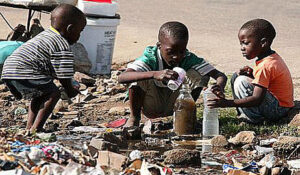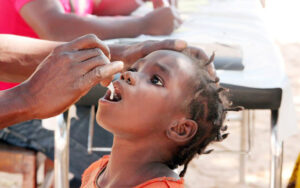Cholera is a severe diarrhoeal disease caused by the bacteria Vibrio cholerae. It continues to affect countries worldwide, particularly those with limited access to clean water and poor sanitation. In Ghana, cholera remains a significant public health challenge, especially during the rainy season when floods exacerbate the spread of waterborne diseases. Despite advances in healthcare and sanitation efforts, the country still battles recurring outbreaks that strain health systems, affect communities, and sometimes result in tragic losses. Understanding the root causes of cholera’s persistence in Ghana is essential to crafting effective, long-term solutions.
The current outbreak has already claimed 16 lives in Greater Accra and Central Regions of Ghana, with over 70 people on admission.
Why does Cholera Persists in Ghana?
Several key factors contribute to the ongoing presence of cholera in Ghana, ranging from infrastructure to socioeconomic issues.
1. Inadequate Water and Sanitation Infrastructure

Access to clean drinking water and proper sanitation facilities remains a major challenge, particularly in rural areas and informal settlements in urban centers like Accra and Kumasi. Poor waste disposal practices and limited sewage systems result in environmental contamination. According to the Ghana Statistical Service, 1 in 4 households still practice open defecation, resulting in contamination of ground water sources with bacteria including Vibrio cholerae. This situation is worse in crowded neighborhoods where access to clean, well-maintained sanitation facilities is often limited.
2. Seasonal Flooding and Rainy Seasons
Ghana’s tropical climate brings heavy rains, particularly from May to October. Seasonal flooding during these months is common and can overwhelm drainage systems, allowing floodwaters to mix with waste and enter drinking water sources. This rapid contamination, combined with limited drainage and waste management infrastructure, leads to ideal conditions for cholera outbreaks.
3. Public Health Education and Awareness
While awareness about cholera prevention has improved, there is still a gap in hygiene practices in some communities, such as regular handwashing especially after using the washroom, safe food handling, and effective water treatment at home. Limited resources also restrict the reach and frequency of public health campaigns, especially in rural areas. Many people in vulnerable communities may be unaware of basic prevention techniques, such as using Oral Rehydration Salts (ORS) or boiling water before consumption, due to a lack of targeted health education.
4. Delay in Accessing Healthcare
Ghana has made strides in healthcare and in spite of on going challenges, many lives are saved on a daily basis. Many victims delay in reporting to hospital, likely due to financial challenges. This delay tends to be costly due to how rapidly cholera progresses. It is important to report to the nearest clinic when you experience diarhoea and vomiting.
Impact of Cholera on Ghana are extensive, affecting the country’s economy and social well-being. Beyond the immediate risks of severe dehydration and death from untreated cholera, outbreaks place immense pressure on healthcare resources.
Health workers face the challenge of caring for large numbers of patients while trying to contain further spread. The disease’s impact on productivity is another concern, as communities dealing with outbreaks often see school and work attendance decline, exacerbating poverty in already vulnerable areas.
Combating Cholera in Ghana
Reducing cholera in Ghana requires a multifaceted approach that addresses both immediate response strategies and long-term preventive measures. Here are key areas of focus:
1. Improving Water and Sanitation Infrastructure
Investing in clean water systems and expanding access to sanitation facilities are essential steps in fighting cholera. The construction of boreholes, protected wells, and improved drainage systems in high-risk areas can dramatically reduce cholera outbreaks. In urban centers, upgrading sewage and waste disposal systems, as well as enforcing policies against open defecation, can help curb contamination.
2. Public Health Campaigns and Education
Comprehensive public health education can empower communities with the knowledge to protect themselves from cholera. Campaigns focused on handwashing, safe food handling, and water treatment practices, such as boiling or chlorinating water, can make a substantial difference. Schools and community centers are ideal locations for hygiene training programs, particularly in vulnerable communities with limited access to health information.
3. Strengthening Emergency Response Capacity
To better handle outbreaks, healthcare facilities must have adequate resources and staffing, especially in rural and high-risk areas. Equipping health centers with sufficient stocks of ORS, IV fluids, and antibiotics can save lives. Building strong local partnerships with community health workers, NGOs, and local authorities can facilitate a rapid response to outbreaks, helping to contain cholera quickly.
4. Vaccination Campaigns

The World Health Organization (WHO) has approved oral cholera vaccines (OCVs) as an effective preventive tool, especially in areas prone to outbreaks. Implementing regular vaccination campaigns in high-risk regions can provide immunity to vulnerable populations and reduce the severity and spread of cholera during outbreaks.
5. Long-Term Investment and Policy Development
Sustainable improvements in water and sanitation require long-term investment and policy initiatives. Government policies that prioritize funding for water infrastructure, sanitation facilities, and rural healthcare support are crucial to ending cholera outbreaks. Additionally, partnerships with international organizations can provide technical and financial resources, enhancing Ghana’s capacity to improve its water and sanitation infrastructure.
In conclusion, Cholera remains a persistent and preventable public health threat in Ghana, driven by challenges in water access, sanitation, and public awareness. While the government and health organizations have made significant progress in recent years, addressing cholera fully requires a comprehensive approach that includes infrastructure upgrades, targeted public health education, and rapid response systems. With sustained investment and a commitment to reaching all communities, Ghana can work toward eliminating cholera as a recurring health issue and ensuring healthier, more resilient communities.







